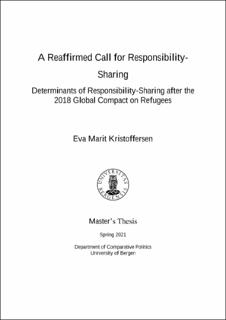| dc.description.abstract | This thesis investigates what can explain states’ contributions to responsibility-sharing in the implementation of the Global Compact on Refugees. Refugees and the responsibilities of refugee protection continue to be unevenly distributed among states and limited responsibility-sharing is keeping the international community from finding sustainable solutions for the refugees and the host communities. In 2018, the Global Compact on Refugees reaffirmed the call for international responsibility-sharing. Earlier attempts to explain why states contribute to responsibility-sharing have often been limited to responsibility-sharing between certain countries or within specific regions. In the implementation of the Global Compact on Refugees states have made commitments through the Global Refugee Forum, offering a unique opportunity to explore international responsibility-sharing with a comparative perspective and a wide scope of contributions. I use a multimethod framework to first explore what responsibility-sharing in the implementation of the Global Compact on Refugees looks like and construct a variable measuring Responsibility-Sharing Commitments. Thereafter I build a theoretical framework on earlier attempts to explain states’ behavior in contributing to responsibility-sharing, which is tested with a negative binomial regression analysis. I find that a small number of the pledges to the Global Refugee Forum are responsibility-sharing. Despite a reaffirmed call for responsibility-sharing, there is still a great absence of sufficient international cooperation to protect refugees. However, the findings showed that a wider scope is present as the unconventional means of Material and Technical assistance, and Policy and Legal Reform are being used. Furthermore, the findings from the negative binomial regression suggest that a determinant of contributions to responsibility-sharing is the economic size of the state. Moreover, I find that the asylum capacity, the exposure to displacement in the region, whether a state is a former colonial power, and the number of conventions to protect that the state has signed do not have an effect on states’ contributions. This indicates that the tested explanations may not be applicable for explaining why states contribute to an international call for refugee responsibility-sharing. Moreover, it suggests that international cooperation to protect refugees is driven by states’ consequentialist logic, which indicates that incentives are necessary for cooperation and that UNHCR’s use of resources to implement the principle of responsibility-sharing as a norm might be misguided. | |
